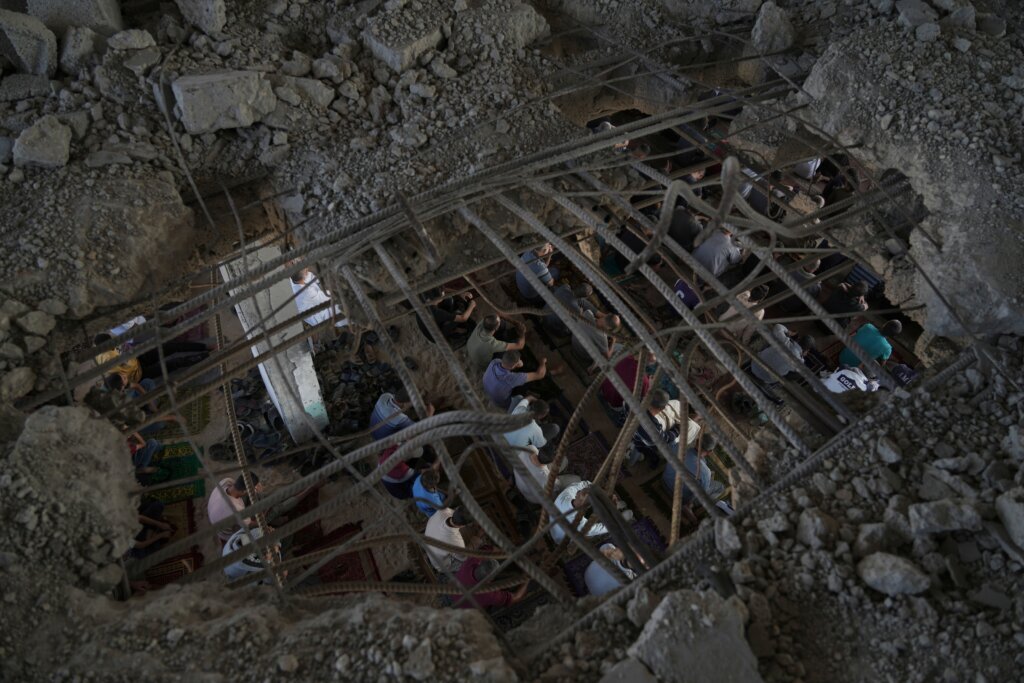Bassil Naggar can finally sleep without being jolted awake by the sounds of Israeli airstrikes. For Naggar and his displaced family, as well as many others in Gaza facing similar challenges, the ceasefire in the Israel-Hamas war has provided a much-needed respite from a devastating conflict that has lasted two years, killed tens of thousands of Palestinians, and left much of the territory in ruins.
Yet, many daily struggles—big and small—persist. From finding a proper roof over one’s head and deciding what to wear as winter approaches, to securing adequate food and worrying whether the fragile ceasefire will hold, life remains difficult.
Since the ceasefire took effect on October 10, many displaced families have been able to return to their neighborhoods and assess the damage. The extent of personal and communal losses has become clearer.
“Life after the ceasefire is still anxious. Is the war really over?” said Naggar, who has been displaced about a dozen times since the war began. His fears are fueled by memories of deadly Israeli airstrikes in March that shattered an earlier truce.
In the coastal area of Muwasi, crowded with displaced Palestinians, Naggar’s tent has started to wear thin. His home in eastern Khan Younis was burned down. With winter approaching, he worries about how his family can keep warm. They have been surviving mostly on canned food such as fava beans and chickpeas. He noted seeing instant noodles and potato chips appear in the market. While prices have decreased somewhat, they remain prohibitively expensive.
The World Food Program (WFP) is “moving swiftly to scale up food assistance and reach families who have endured months of blockade, displacement, and hunger,” spokesperson Abeer Etefa said Friday in Geneva.
“We’re still below what we need, but we’re getting there,” Etefa added, citing challenges such as damaged infrastructure and the ongoing need to keep border crossings into Gaza open.
Earlier in the week, the entry of desperately needed humanitarian aid into Gaza was paused for two days to allow for the exchange of hostages and prisoners and in observance of a Jewish holiday. Israel also threatened to reduce the number of trucks carrying aid into Gaza, accusing Hamas of being too slow in returning the remains of hostages.
Under the ceasefire agreement, hundreds of trucks are supposed to enter Gaza daily. COGAT, the Israeli military body overseeing humanitarian aid, has not responded to inquiries about how many aid trucks have made it into Gaza since the ceasefire began.
Naggar said he has not noticed a significant increase in aid since the ceasefire.
The conflict’s toll is staggering. On October 7, 2023, a Hamas-led attack sparked the war, during which militants abducted 251 people and killed around 1,200. In response, Israel launched a massive offensive in Gaza, where the Gaza Health Ministry, part of the Hamas-run government, reports nearly 68,000 Palestinians have been killed. The ministry’s casualty records are generally considered reliable by U.N. agencies and independent experts.
Hardships remain evident. At a crowded charity kitchen in the central city of Deir al-Balah, scores of Palestinians waited with bowls and pots in front of large vats of rice. Fatima Shaat, displaced from Khan Younis, said she waited six hours for food.
Basma Abu Al-Kheir noted that while some goods have arrived, “there is no possibility of buying what we want” because prices remain too high.
In Deir al-Balah’s markets, Fida Ziyad remarked that tomatoes, cucumbers, and eggplants are available, but poultry and meat are scarce and all food items cost more than before the war. Ziyad, who lost her home in northern Gaza, expressed caution about the future, with many thorny issues still unresolved.
For many, normalcy remains elusive.
After the ceasefire, Mohamed Samy returned to his home in Jabaliya only to find it reduced to rubble. Now living in Gaza City, Samy said little in his situation has changed since the ceasefire. “Even drinking water, I have to walk, sometimes up to an hour, to get to the water truck,” he said.
In August, the world’s leading authority on food crises declared Gaza City to be gripped by famine, warning it was likely to spread without a ceasefire and the lifting of restrictions on humanitarian aid. Israel rejected the report, with Prime Minister Benjamin Netanyahu calling it an “outright lie.”
Before then, aid groups had warned for months that Israel’s restrictions and military offensive were causing starvation among Palestinian civilians, particularly children.
Since the ceasefire began, at least nine humanitarian organizations have gradually resumed services in Gaza City and northern Gaza, according to a U.N. humanitarian affairs report released Thursday.
In Deir al-Balah, Ayman Abu Saif continues to rely on charity kitchens for food. “It’s either rice or pasta,” said Abu Saif, who previously worked in hospitality and has been repeatedly displaced during the war.
“The prices in the market are now more reasonable,” he added, recounting a small victory: buying his children three apples for the first time in over a year.
Still, Abu Saif remains uncertain about returning to his home in Gaza City, having seen photos of its destruction.
“It’s not just my home that’s gone. There is no water and no infrastructure. I cannot go back even if I want to,” he said.
Many displaced Palestinians returning to their neighborhoods have found collapsed, pockmarked, and hollowed-out buildings, sifting through debris for traces of their past lives.
Abu Saif lamented the impact the war has had on his children and fears for their future.
“It’s good that the bloodshed has stopped, but we have lost everything,” he said. His six-year-old son has not received a proper education and likely won’t anytime soon.
“I do not want my kids to think that this is what life is—running behind a charity kitchen to get food, or walking long distances to get clean water,” Abu Saif said. “This is not reality and this is not what life is. I am not sure life in Gaza will change soon.”
— Fam reported from Cairo. Associated Press writers Geir Moulson in Berlin, Sam Metz in Jerusalem, and Kareem Chehayeb in Beirut contributed to this report.
https://wtop.com/national/2025/10/daily-struggles-persist-in-gaza-even-as-ceasefire-offers-some-respite/


